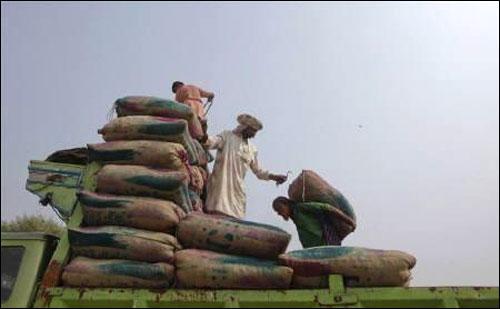Photographs: Reuters Nayanima Basu in New Delhi
The so-called trade normalisation process between India and Pakistan has come to a screeching halt, it seems.
With recent tensions between the nuclear-armed neighbours due to the killing of two Indian soldiers on the Line of Control (LoC), the ongoing talks for liberalising trade have stopped. The Indian side has clearly told Pakistan it would not proceed any further on the matter.
Officials have told Business Standard "all is not well". The Indian side has already cancelled all technical level meetings relating to trade in power and petroleum. A high-powered Pakistan business delegation, supposed to take part in an upcoming business conference organised by the Confederation of Indian Industry in Agra, has cancelled the visit. Officials have also indicated the much-awaited visit by Pakistan commerce minister Makhdoom Amin Fahim might not take place.
The government today also delayed the issuance of visa on arrival to senior citizens of Pakistan coming to India through the Attari-Wagah border. A senior government official involved in the talks said the government might put the entire visa agreement of last September on hold - it had sought to offer a liberal visa regime for Pakistan business people.
While Pakistan has been dithering on granting Most Favoured Nation (MFN) trade status to India, it has also not expanded cross-border trade through the Attari-Wagah border. During the last meeting between India's commerce secretary, S R Rao, and his Pakistan counterpart, Munir Qureshi, in September last year, it was decided that once Pakistan expanded trade on the Attari-Wagah border, the Indian side would bring down its sensitive list of items by 30 per cent, that Pakistan will not be allowed to export under the South Asia Free Trade Agreement (Safta).
But failure to adhere to the deadline of December 2012 to grant MFN or non-discriminatory status to India by Pakistan have soured business sentiments further.
In a recent interview to Business Standard before the beheading on the LoC took place, Pakistan high commissioner Salman Bashir had said that normalising of trading relations with India was in Pakistan's interest and their government would not break any commitment made.
While addressing the Army Day event today, Prime Minister Manmohan Singh said it cannot be "business as usual" with Pakistan." And, External Affairs Minister Salman Khurshid today questioned the seriousness of Pakistan in pursuing normal relations. "It should not be felt that the brazen denial and a lack of proper response from the government of Pakistan to our repeated demarches on this incident will be ignored and that bilateral relations could be unaffected or that there will be business as usual. Such actions by the Pakistan army not only constitute a grave provocation but lead us to draw appropriate conclusions about Pakistan's seriousness in pursuing normalisation of relations with India," Khurshid said.
The two countries had decided to normalise trading relations on April 28, 2011, with India's then commerce secretary, Rahul Khullar, and his then Pakistan counterpart, Zafar Mahmood, preparing an ambitious list for enhancing bilateral trade. The talks were spearheaded by commerce and industry and textiles minister Anand Sharma and Pakistan commerce minister Makhdoom Amin Fahim, with the foundation laid earlier by the two PMs, Singh and his then counterpart, Yousuf Raza Gilani.
Both sides were even contemplating having a free trade agreement once trade normalisation took place in its true spirit. However, with tensions now soaring on both sides of the border, trade normalisation remains a dream.



article